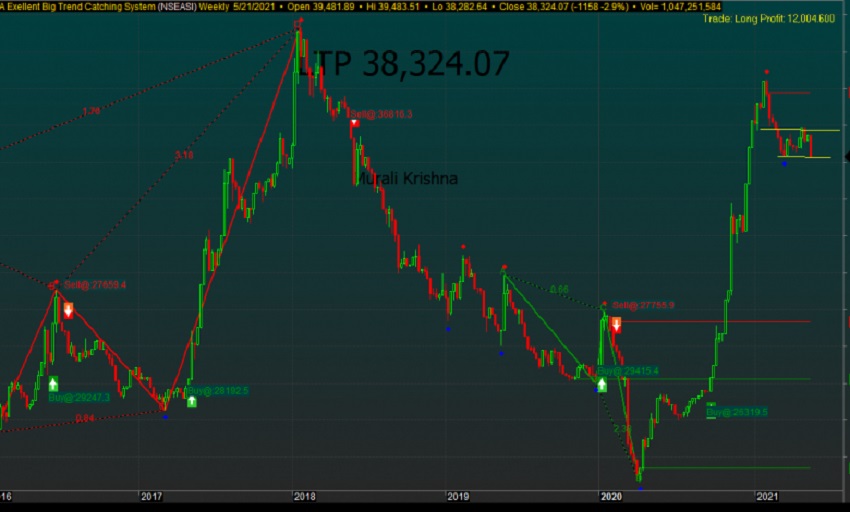Economy
NGX Index Down 0.01% as Traders Stay Back to Monitor Developments

By Dipo Olowookere
The domestic stock exchange witnessed low trading activities on Friday, with mild profit-taking depressing the share prices of some blue-chip equities like Lafarge Africa, Access Holdings and others.
Business Post reports that investors decided to stay back to watch happenings in the macroeconomic landscape as some prepare for the Sallah holidays for next Monday and Tuesday.
When trading activities closed yesterday, the market reversed the previous day’s growth to settle lower by 0.01 per cent as the All-Share Index (ASI) lost 6.32 points to finish at 51,557.41 points compared with Thursday’s 51,563.73 points as the total value of stocks on the Nigerian Exchange (NGX) Limited went down by N4 billion to N27.803 trillion from N27.807 trillion.
The insurance and industrial goods sectors depreciated during the session by 0.74 per cent and 0.05 per cent respectively, the banking and energy counters gained 0.15 per cent and 0.09 per cent apiece, while the consumer goods index closed flat.
During the session, investors traded 115.1 million stocks worth N1.78 billion in 3,479 deals in contrast to the 143.3 million stocks worth N1.76 billion traded in 3,874 deals on Thursday, signifying an increase in the trading value by 1.29 per cent and a decline in the trading volume and number of deals by 19.65 per cent and 10.20 per cent respectively.
GTCO was the most traded stock as it transacted 17.9 million units worth N364.4 million, UBA traded 14.3 million units valued at N107.8 million, Zenith Bank sold 8.4 million units worth N183.6 million, Sterling Bank exchanged 7.5 million units worth N11.2 million, while Access Holdings transacted 6.4 million units worth N60.4 million.
A total of 13 equities gained points yesterday compared with the 12 equities lost points, with NAHCO losing 7.31 per cent to settle at N8.62.
Cornerstone fell by 5.48 per cent 69 Kobo, Consolidated Hallmark Insurance depreciated by 4.00 per cent to 72 Kobo, Japaul declined by 3.57 per cent to trade at 27 Kobo, while Transcorp lost 3.13 per cent to finish at N1.24.
On the flip side, Caverton gained 9.91 per cent to N1.22, Academy Press appreciated by 9.88 per cent to N1.89, Neimeth went up by 9.40 per cent to N1.63, Courteville rose by 6.52 per cent to 49 Kobo, UPDC gained 5.98 per cent to sell for N1.24.
Economy
Customs Street Suffers 0.08% Contraction as Investors Book Profit

By Dipo Olowookere
Another opportunity presented itself for investors to book profit on the Nigerian Exchange (NGX) Limited on Wednesday, and this was grabbed with both hands.
This profit-taking moderated Customs Street by 0.08 per cent at midweek, as market participants monitor global happenings, especially the Middle East crisis.
Last weekend, the United States and Israel launched airstrikes on Iran, causing the price of crude oil to rise on the global market.
Energy stocks on the local bourse have gained because of this in the past trading sessions, but yesterday, they witnessed sell-offs.
According to data from the NGX, only the insurance counter ended in green after it chalked up 0.33 per cent, as the others pointed south.
The consumer goods sector depreciated by 0.86 per cent, the banking index shed 0.45 per cent, the industrial goods space shrank by 0.03 per cent, and the energy segment also declined by 0.03 per cent.
As a result, the All-Share Index (ASI) gave up 158.74 points to settle at 196,463.22 points compared with the previous day’s 196,621.96 points, and the market capitalisation decreased by N102 billion to N126.097 trillion from N126.199 trillion.
Jaiz Bank crashed by 10.00 per cent to N10.80, Dangote Sugar also lost 10.00 per cent to trade at N74.70, CAP slipped by 9.97 per cent to N84.85, Union Dicon staggard by 9.94 per cent to N14.95, and Haldane McCall went down by 9.89 per cent to N3.92.
On the flip side, Premier Paints gained 10.00 per cent to sell for N12.10, Fortis Global Insurance appreciated by 9.73 per cent to N1.24, UAC Nigeria increased by 7.78 per cent to N115.00, Eterna jumped by 6.38 per cent to N35.00, and Custodian Investment grew by 6.06 per cent to N70.00.
At the close of business, there were 22 appreciating stocks and 37 depreciating stocks, implying a negative market breadth index and weak investor sentiment.
Investors transacted 805.3 million shares worth N38.4 billion in 71,312 deals yesterday compared with the 880.0 million shares valued at N44.5 billion traded in 86,761 deals a day earlier, indicating a shortfall in the trading volume, value, and number of deals by 8.49 per cent, 13.71 per cent, and 17.81 per cent, respectively.
The busiest stock on Wednesday was Veritas Kapital with 56.4 million units valued at N130.0 million, Jaiz Bank exchanged 51.0 million units worth N576.2 million, Universal Insurance transacted 48.4 million units for N61.4 million, Zenith Bank sold 47.6 million units valued at N4.4 billion, and Access Holdings traded 46.4 million units worth N1.2 billion.
Economy
Bankroll Management Strategies for Long-term Survival

In an era where digital financial opportunities are more accessible than ever, the difference between success and failure often boils down to a single factor: discipline. Whether one is navigating the volatile world of stock trading, exploring the emerging DeFi sector, or engaging with high-performance entertainment platforms, the ability to manage capital is paramount. In Romania, where the digital economy has seen an unprecedented surge, many participants focus heavily on “the big win” while neglecting the defensive strategies required to stay in the game long enough for those wins to materialize.
Understanding the core principles of capital preservation
A robust strategy begins with separating personal funds from the “bankroll.” This removes emotional weight from losses and protects household stability—a habit increasingly adopted in Romania as financial literacy grows. This foundation ensures rational decision-making during volatility. Once established, the “Rule of Survival” mandates that no single event should deplete the fund, requiring fractional allocation. Several models help implement this:
- Fixed percentage: Risking 1% to 3% per transaction to prevent total wipeouts.
- Kelly criterion: Adjusting allocation based on perceived edge and probability for efficient growth.
- Unit-based: Dividing the bankroll into units (e.g., 100) to standardize risk based on confidence levels.
These systems provide a roadmap to navigate uncertainty and prevent “chasing losses,” turning a reactive participant into a strategic manager.
The role of digital platforms in financial monitoring
The modern Romanian user has access to a wide array of tools that make tracking and managing a bankroll easier than in previous decades. From mobile banking apps that categorize spending to specialized software for portfolio tracking, the technological infrastructure in Romania supports high levels of transparency. Choosing the right environment is just as important as the strategy itself, as the speed of execution and the reliability of the system can directly impact the bottom line. Reliable digital environments like mrbet showcase how integrated technology can help users keep track of their activity while maintaining a focus on performance and security.
Adapting strategies to the Romanian economic landscape
Romania presents a unique set of circumstances for capital management, characterized by a mix of local currency (RON) and the heavy use of the Euro for major investments or digital transactions. Currency fluctuations can add an extra layer of risk that is often overlooked. A savvy manager must account for exchange rates and transaction fees when calculating their net bankroll, as these “hidden” costs can erode profit margins over time. Furthermore, the local tax regulations regarding digital earnings require a proactive approach to ensure that a portion of the bankroll is always set aside for legal obligations.
Long-term survival through emotional discipline
The most sophisticated mathematical model in the world will fail if the individual lacks the emotional discipline to follow it. Human psychology is hardwired to feel the pain of loss more acutely than the joy of gain, a phenomenon known as loss aversion. In Romania’s competitive digital space, the pressure to “keep up” with others’ perceived successes can lead to over-leveraging and the abandonment of sound management principles. In dynamic settings like mr bet casino live, where interaction is constant and the pace is fast, long-term survival depends on the ability to remain detached from the outcome of any single event and to focus instead on the integrity of the process.
Setting “stop-loss” limits and “take-profit” targets are essential psychological anchors. These are not just technical tools; they are commitments made to oneself during a state of calm that serve as a guardrail when the “heat of the moment” takes over. To maintain this discipline over months or years, consider the following habits:
- Maintaining a detailed log: Documenting every move, the reasoning behind it, and the emotional state at the time helps in identifying recurring mistakes.
- Scheduled reviews: Taking time every week or month to evaluate the bankroll’s health away from the “active” environment ensures a more objective perspective.
- Continuous education: Staying informed about new financial tools and local economic shifts in Romania helps in refining the strategy as the environment evolves.
By treating capital management as a skill to be mastered rather than a chore to be avoided, the individual builds a psychological fortress. This mindset is what separates the survivors from those who are merely passing through the digital economy.
Building a legacy of financial resilience
Bankroll management is the ultimate survival tool in the digital age. It is the bridge between reckless speculation and sustainable growth, providing the structure needed to navigate the complexities of the Romanian and global financial markets. By understanding the principles of preservation, utilizing the right digital tools, and maintaining a high level of emotional discipline, anyone can increase their chances of long-term success. The goal is not just to survive the next week or month, but to build a foundation that can withstand the tests of time and market volatility.
Economy
Minister Woos European Investors With Nigeria’s Steel Industry

By Adedapo Adesanya
Nigeria’s Minister of Steel Development, Mr Shuaibu Abubakar Audu, has told European investors that the country’s steel sector alone consumes about $10 billion annually, presenting a huge market opportunity for serious global players.
In a statement by the Director of Information and Public Relations in the ministry, Ms Salamatu Jibaniya, it was stated that the Minister made this disclosure when he took Nigeria’s industrialisation drive to Germany, declaring that the country is ready to trade its abundant raw materials status and embrace full-scale value addition.
Addressing the Nigeria–German Economic Forum in Dortmund, Mr Audu projected Nigeria as Africa’s next industrial hub, in line with the Renewed Hope Agenda of President Bola Tinubu.
“With a population of nearly 250 million, largely youthful and energetic, Nigeria is primed for industrial take-off,” he said.
He disclosed that the country holds over three billion tonnes of iron ore, alongside vast deposits of limestone, manganese, copper, lead-zinc, lithium and rare-earth minerals, positioning Nigeria for both domestic industrial growth and export expansion.
Mr Audu urged EU investors to key into steel and aluminium production, mineral beneficiation and processing, as well as critical infrastructure development covering power, rail, gas and ports.
He stressed that beyond capital inflow, Nigeria is prioritising technology transfer and technical skills development to strengthen local capacity.
At the high-level forum, the minister was received by Germany’s Minister for Federal, International and European Affairs, Mr Nathanael Liminski; Lord Mayor of Dortmund, Mr Alexander Kalouti; President of the Dortmund Chamber of Commerce and Industry, Mr Heinz-Herbert Dustmann; and Consul General to Slovakia, Mr Klaus Wagener.
-

 Feature/OPED6 years ago
Feature/OPED6 years agoDavos was Different this year
-
Travel/Tourism10 years ago
Lagos Seals Western Lodge Hotel In Ikorodu
-

 Showbiz3 years ago
Showbiz3 years agoEstranged Lover Releases Videos of Empress Njamah Bathing
-

 Banking8 years ago
Banking8 years agoSort Codes of GTBank Branches in Nigeria
-

 Economy3 years ago
Economy3 years agoSubsidy Removal: CNG at N130 Per Litre Cheaper Than Petrol—IPMAN
-

 Banking3 years ago
Banking3 years agoSort Codes of UBA Branches in Nigeria
-

 Banking3 years ago
Banking3 years agoFirst Bank Announces Planned Downtime
-

 Sports3 years ago
Sports3 years agoHighest Paid Nigerian Footballer – How Much Do Nigerian Footballers Earn





















